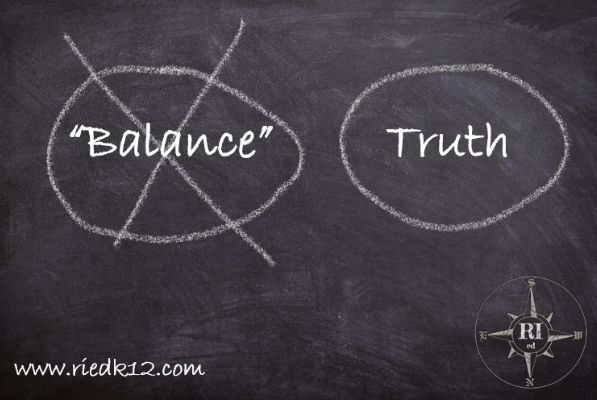We Choose Truth
“The educator has the duty of not being neutral.” ― Paulo Freire
Last month politicians in the Minnesota legislature introduced a bill titled the Academic Balance Policy bill. The stated objective of the bill is that “public education courses are not [used] for the purpose of political, ideological, religious, or anti-religious indoctrination.” The bill requires the school “to provide a learning environment, curriculum, and instruction with access to a broad range of serious opinions pertaining to the subjects of study, including contemporary policy controversies.” At first glance it appears to be a common sense requirement; of course schools should engage serious opinions as well as the most pressing issues of our time. But, when you consider the impetus for the bill you realize that is not the goal of the legislation at all.
The bill stems from the belief that wealthy, white, suburban classrooms are being overtaken by what is deemed to be a “liberal agenda.” This makes the idea of balance in the bill important. Those in power who seek to uphold what Ronald Takaki calls “the master narrative” are feeling the pressure to be more honest in schools. As the oppressed and marginalized continue to make their voices heard and push for corrections to the historical record and a recalibration of the norm, those benefiting from the status quo are scared of losing what they previously took for granted. Hence the push to legislate space for the established narrative and the censoring of teachers who may align with the changing tides. The bill masks this agenda as “balance”; for example, the bill would “require caution from classroom teachers when expressing personal views in the classroom and prohibit the introduction of controversial matters without a relationship to the subject taught, especially matters in which the classroom teacher does not have special competence or training.” This would mean that a unit on slavery would be required to give equal time and value to the slaveholders' perspective as well as the slaves'. Or, a teacher would be prohibited from connecting across content or to real-life events due to not having “special competence of training.” This would effectively end conversations around uncomfortable and nuanced topics, such as race, class, and gender.
At the hearing for the Academic Balance Policy bill, Republican Senator Eric Pratt from Prior Lake, MN challenged opposition to the bill by stating, “Sometimes as conservatives, we often feel as if we’re being asked to be empathetic to one side and one side is never asked to be empathetic to us.” In doing so Pratt exposes the true motivation for this bill: legislating support for oppressive viewpoints. This is not new; controlling education has been a staple of the oppressors' survival strategy. From banning education for the enslaved to the ban of ethnic studies in Arizona to this bill in Minnesota, those in power have vehemently opposed truth-telling and the production of knowledge by oppressed people. They turn to claims of indoctrination to hide their fear of a more equitable and just world. This is simply the most current iteration of what Carol Anderson calls “White Rage.”
The question, then, is how will we respond? Frantz Fanon famously said, “Each generation must, out of relative obscurity, discover its mission, fulfill it, or betray it.” This is our mission. We cannot allow those in power to close ranks and wait out the metaphorical storm. We are in a historical moment where teachers, the vast majority of whom are white people, can make a different choice. Instead of going the way of least resistance we can join with the voices of the marginalized across the planet and demand a reckoning, a campaign of truth-telling. That must begin in the classroom. Now is the time not only to object to bills such as the Academic Balance Policy, but to advocate passionately for curriculum that moves us closer to justice and reconciliation.
